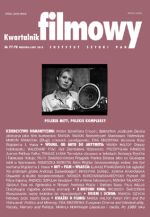Transferując Chopina. "Chopin, piewca wolności" Gézy von Bolváry’ego
Transfering Chopin. Géza von Bolváry’s "Abschiedswalzer" ("Chopin, the Bard of Freedom")
Author(s): Iwona SowińskaSubject(s): Theatre, Dance, Performing Arts
Published by: Instytut Sztuki Polskiej Akademii Nauk
Keywords: Chopin; Frederic; Cinema in Third Reich; History of Poland; "Abschiedswalzer".
Summary/Abstract: "Abschiedswalzer", the biography of Frederic Chopin made in the Third Reich, is usually seen as a sur- prisingly friendly towards Poland and Polish people. The film is regarded by contemporary film histo- rians opposed to the typical argument that film entertainment during the Nazi era was extremely politicised, as well crafted, and free of ideological elements typical of cinematic entertainment of the time. However an analysis of how Chopin’s music is used, the construction of the main characters, omissions and distortions of historical facts, gender strategies applied and the role of the language leads to a different conclusion. The film shows a deep ambivalence towards Chopin. An affirmation of his music is accompanied by discrediting him as a man and as a patriot, which results in visible “germani - zation” of Chopin presented in the film, which germanization however remains incomplete. From the film it might be inferred what were the official priorities of the German foreign policy of the time (cor - rect relations with the neighbouring states, and also an anti-soviet direction) but also the expansionist ambitions of the Third Reich. Before the Germans began to realize the idea of colonising the East by military means, the expansion was a cultural one, and was served by films such as "Chopin, the Bard of Freedom".
Journal: Kwartalnik Filmowy
- Issue Year: 2012
- Issue No: 77-78
- Page Range: 6-24
- Page Count: 19
- Language: Polish

